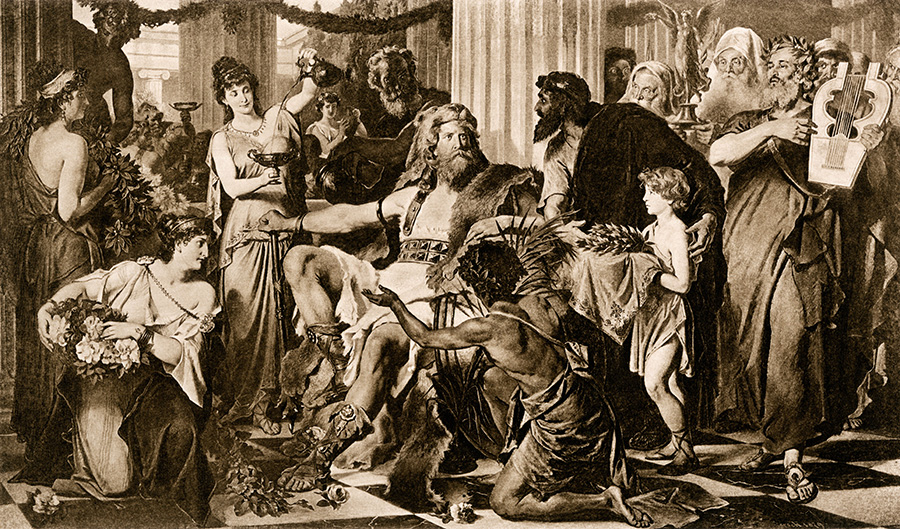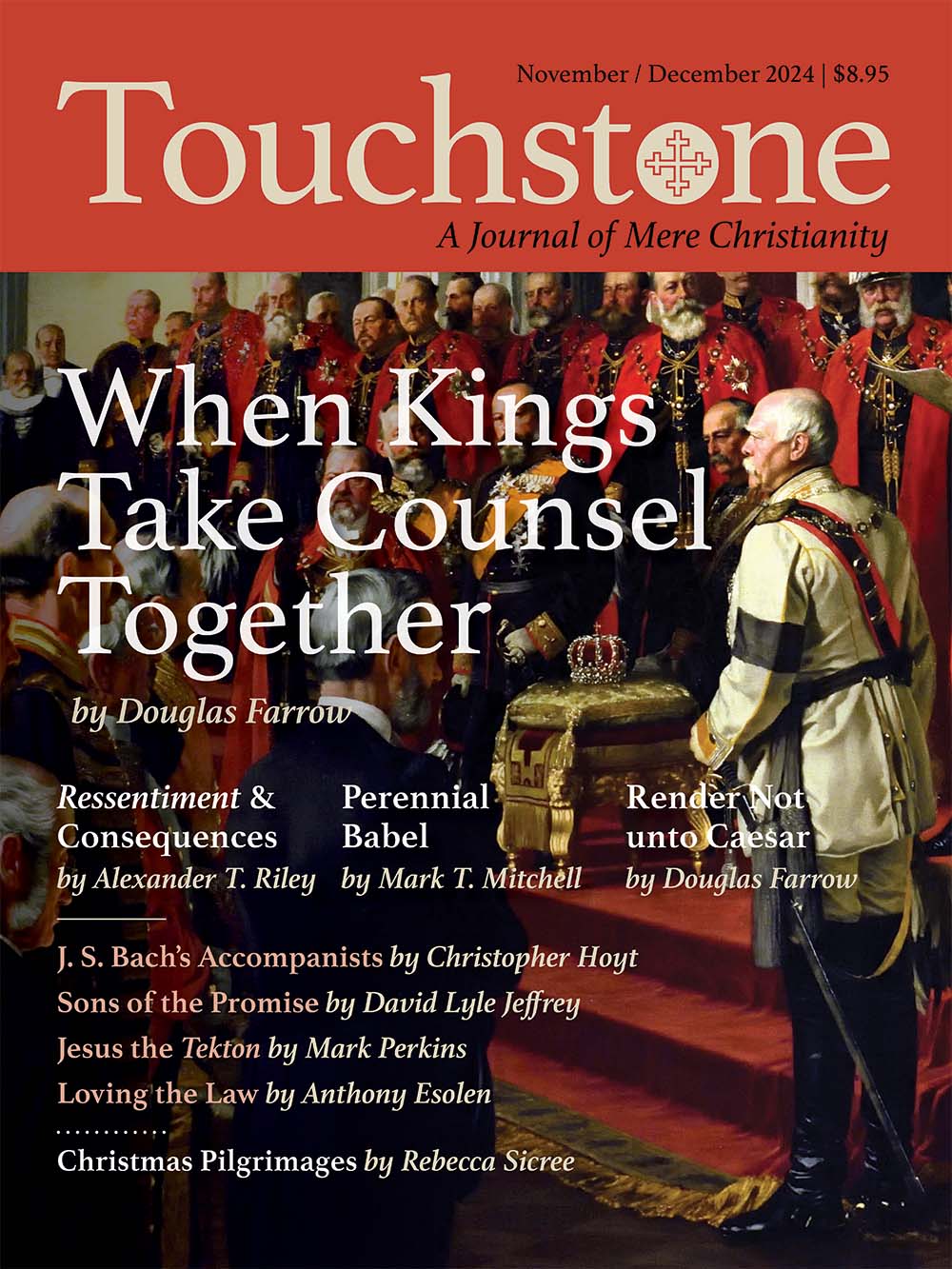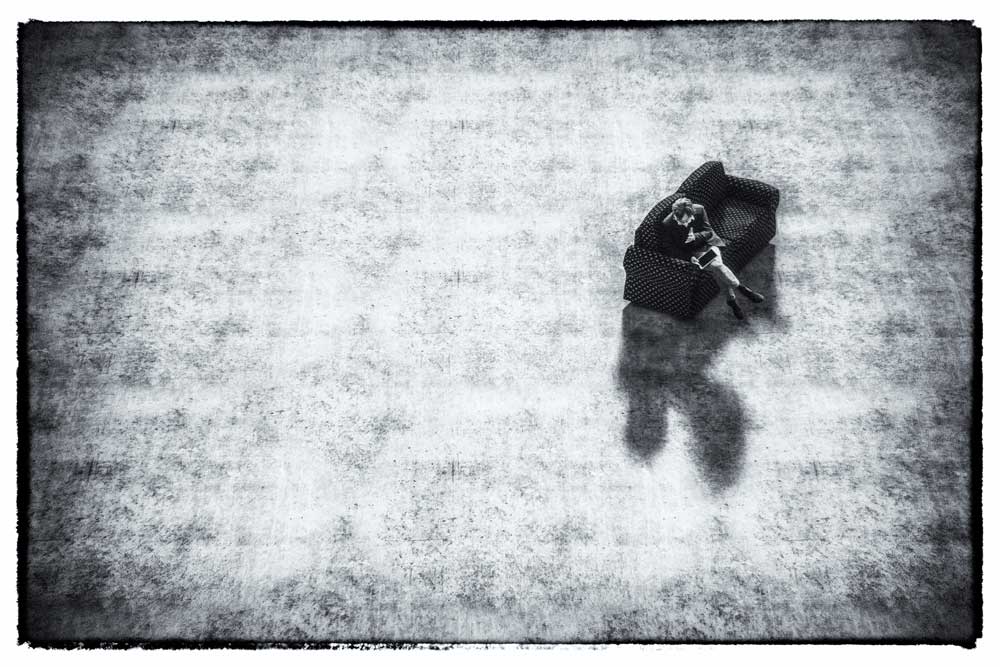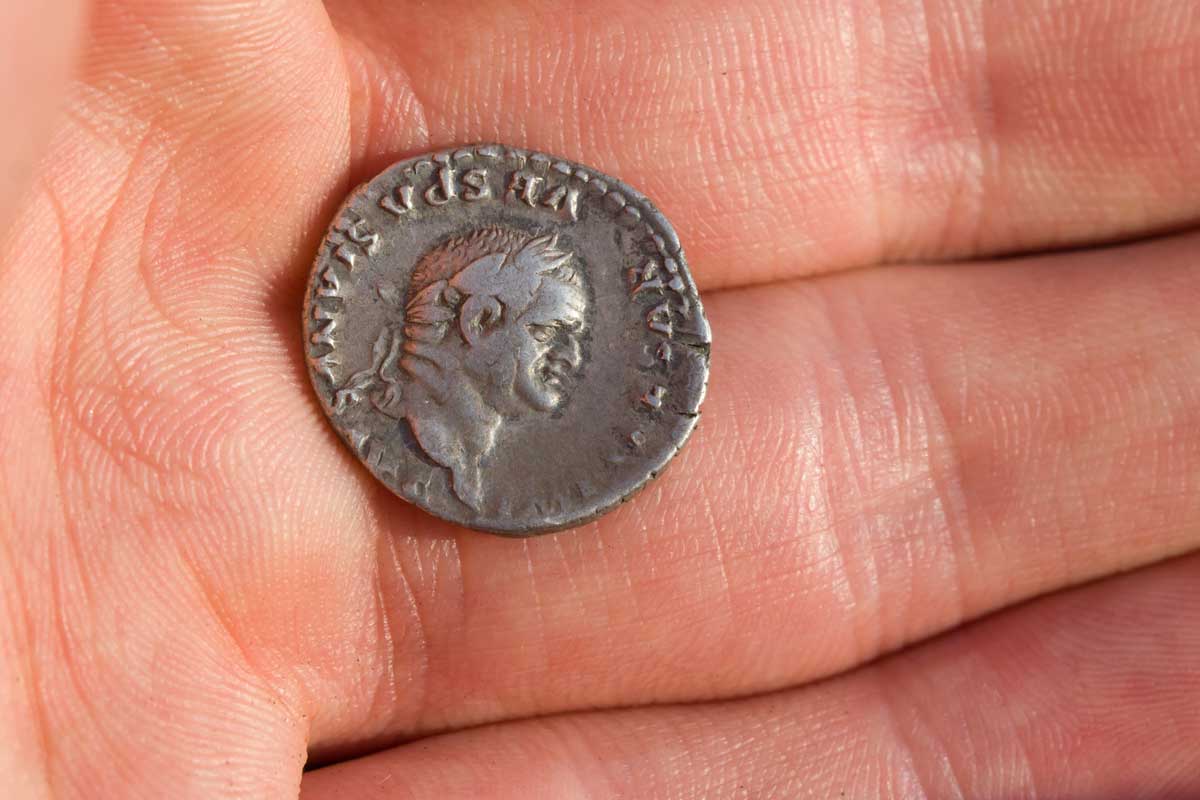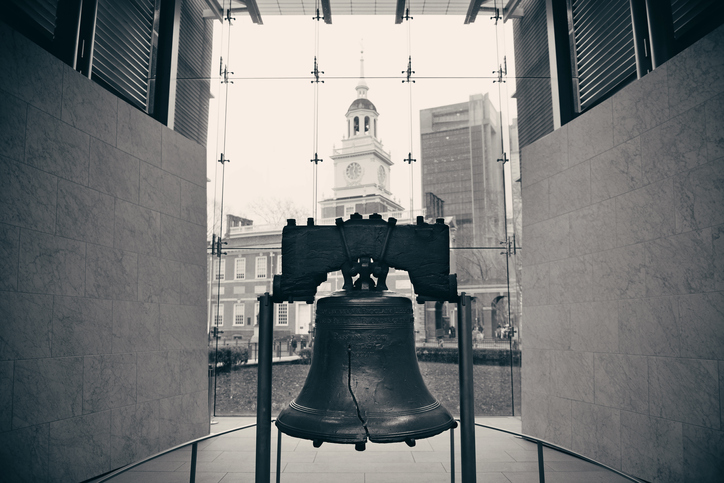When Kings Take Counsel Together
The World May Not Rule Itself Without Christ
The wars of the last century dealt the myth of progress a deadly blow. Moral order disappeared in puffs of musket smoke in Europe, then in mushroom clouds over Japan. The West, contrary to popular opinion, did not win the Cold War that followed. Rather, it lost its democracies to a military-industrial complex into which it imported fascist war criminals. It lost the foundations of domestic order to sexual revolutionaries. It lost its universities to socialist revolutionaries. And now it is succumbing, as N. S. Lyons has argued, to a managerial revolution in which nothing is to elude the scrutiny of the bureaucrats. It is succumbing, as I have argued, to a “public health” revolution in which the individual good disappears into some putative common good determined at a planetary level by the Controllers against whom Chesterton and Huxley and Lewis warned us. A totalitarian plutocracy, backed by a pantheon comprising Secularism, The Science, Artificial Intelligence, Climate Change and other deities, is assuming control of everything from money to medicine to movements of peoples and goods. They are the mighty in the land, the arrogant whom Asaph envied:
They are free from common human burdens;
they are not plagued by human ills.
Therefore pride is their necklace;
they clothe themselves with violence.
From their callous hearts comes iniquity,
their evil imaginations have no limits.
They scoff, and speak with malice;
with arrogance they threaten oppression.
Their mouths lay claim to heaven,
and their tongues take possession of the earth.
Therefore their people turn to them
and drink up waters in abundance.
They say, “How would God know?
Does the Most High know anything?”
(Ps. 73:5–11)
From such men a new kind of “authority” is emerging in which no reference is made to natural or divine law, or even to the consent of the governed. They have taken counsel together, in their public-private partnerships, and they are deliberately dissolving what is left of civil society that they might “build back better” with a system of well-monitored serfdom. They are devising a bio-security state in which the number of men, the activities of men, and even the human genome will be subject to them.
Their project will fail. Their great Tower, with its high-speed communications rivaling those of the cherubim, will last but briefly. When Asaph withdrew into the sanctuary of God, to pray for a way of escape from his temptation, he perceived their end:
Truly thou dost set them in slippery places;
thou dost make them fall to ruin.
How they are destroyed in a moment,
swept away utterly by terrors!
They are like a dream when one awakes,
on awaking you despise their phantoms.
(Ps. 73:18–20)
Yes, their project will fail. But only after first appearing to succeed. Already we behold its outline and discern its nature. We believe authority to be grounded in God. These people do not believe in God. We believe all authority to have been given to God’s Christ. They do not believe in Christ. We believe that the present age is a time for choosing to enroll in the service of Christ and to discover there “the greater operation of liberty.” These men are not interested in liberty. We believe in law and lawfulness as indispensable to liberty. These men introduce lawlessness into law. They rule by crisis, by emergency, by a state of exception. Which creates a conundrum: as the mystery of lawlessness percolates through the remains of our civilization, dissolving ancient assumptions and institutions, how are we ourselves to be lawful?
On Law & Authority
There are, as Aquinas observes, four kinds of law: two that are fundamental, namely, the eternal law and natural law; and two forms of positive law, divine and human. Eternal law is the highest of the four. It is the law governing creation that exists in the mind of the Maker. The second is the most basic to man, for it is that same law insofar as God has made it accessible to rational animals; it is what we can know or discover of the eternal law. The third is the law God crafts for us and delivers to us, not merely by reason but by revelation, whether under the old covenant or the new. The fourth is civil law, the laws we craft for ourselves, that we may live together in some degree of conformity to natural and divine law. This also takes two forms: as canon law in the city of God, and as secular law in the city of man.
Secular law, though good and necessary, comes last and least. Where it violates natural or divine law, it does not have the binding force of law, so far as the conscience is concerned. For every human being is duty-bound to obey God at all times. God, on the other hand, is bound by none but himself. He is what he has and has what he is. He is therefore a law unto himself. It is not so with us. With us, law depends on authority. Law, it is true, helps us know who has authority and what authority they have. But there is no law without authority to make law. Only by divine authority does the world exist, with its laws; only by divine fatherhood do families and tribes exist, with their laws. The authority to order their relations by law is a participation, however remote, in his authority.
Otherwise put, all authority comes from God while remaining with God. It does not go forth from God in such a way as to abide independently with creatures. They have it exactly as they have everything else. They have it as a gift entrusted to them. They have it in such a way as to remain accountable for their use of it. They are stewards, not masters, of their own lives and laws.
Recall the great king, Uzziah, whom God struck with leprosy when he went into the temple to pray. Why? Because he presumed to preside over his own sacrifice. He acted as one who had authority he did not have. In contrast, consider Jesus, who came to heal lepers. He announced to the Jews that the kingdom of God was present in their midst, in his own person, and had at last come within their grasp. So they grasped him, using their own law perversely, and subverting that of the Romans, to nail him to the wracking cross. But no one took his life from him; they had no such authority. He himself had authority to lay it down and to take it up again. When he had done so, he announced that the kingdom had indeed come. “All authority in heaven and on earth has been given to me.”
That is what the apostles were sent into the world to proclaim, that all might ready themselves for the manifestation of the kingdom upon his return in the glory he was about to receive from his Father. “Thus says Cyrus, king of Persia: The Lord, the God of heaven, has given me all the kingdoms of the earth, and he has charged me to build him a house at Jerusalem, which is in Judah.” And what says Jesus, King of kings? “The Lord has given me all the kingdoms of the earth and the heavens into the bargain; now build me my house in every nation under heaven, teaching men to observe all that I have commanded you.”
Law, I repeat, rests on authority. But the question now arises: in what relation to the law of Christ does the ius gentium stand? For Christ is still with the Father; he has not yet returned with glory. It is crucial that we get the answer right. We do not get it right if we suppose that the Church now rules the nations on behalf of Christ. Nor do we get it right if we fancy that the world still rules itself and may do so without reference to Christ. We get it right only if we see that the nations are obligated to Christ and will be judged on that basis when he makes his royal appearance, his Parousia.
Now the word of obligation is, for the moment, an invitation. The leaders of the nations may and should follow the example of the Church and cast their crowns at the feet of Christ. In due course, however, obligation will become stipulation. “Every knee shall bow, whether in heaven or on earth or under the earth.” Meanwhile, mankind has been taught a fundamental principle of authority, as Augustine points out in De Trinitate. The principle is that justice ought to precede power and that genuine authority exists only where justice accedes to power. From which it follows that power attained or exercised without justice is not an exercise in authority but only a simulacrum thereof.
This simulacrum brings authority into crisis, as it is now doing both in the Church and in the world, where violent men still attempt to seize the kingdom by force despite the fact that it has quite escaped their grasp. The kings of the earth take counsel together against the Lord and his anointed. “Let us burst their bonds asunder,” they say, “and cast their cords from us, while we still can.”
They are clever, these proud men. They exacerbate the crisis of authority in every way they can think of, in order to press their false claims to authority. Why do you suppose they are so intent on destroying the family, on erasing the boundaries of peoples and nations, on producing everywhere what Irenaeus called “minglings without cohesion”? Because they would have men call on none but themselves. Why do they hate religion and erase cultural memories? Because there must be no thick centers of culture by which men might resist their will. Why do they back the most radical forms of autonomy, even the most insane, self-mutilating forms? Because they must eradicate even the laws of nature if they are to impose their own lawless laws. Everywhere they introduce chaos, resorting even to acts of terror, that from chaos may emerge an order not beholden to the Creator, not subject to his Word.
But if they are clever, they are also quite mad. “He who sits in the heavens laughs; he has them in derision.” For he has set his King on Zion, his holy hill. They cannot move or remove him. He will terrorize them on the day of his wrath.
On the Situation of the Faithful
Meanwhile, the prayer that was on Jesus’ lips, as he laid down his life, goes up again to heaven from the faithful:
O my God, I cry by day, but thou dost not answer;
and by night, but find no rest.
Yet thou art holy,
enthroned on the praises of Israel.
In thee our fathers trusted;
they trusted, and thou didst deliver them.
To thee they cried, and were saved;
in thee they trusted, and were not disappointed. . . .
For dominion belongs to the Lord,
and he rules over the nations.
Yea, to him shall all the proud of the earth bow down. (Ps. 22:2–5, 28–29)
The situation of the faithful today looks increasingly like that of those who first conquered the kingdoms of the world with the gospel of Christ and the blood of the martyrs, in which is true authority, for they reign with Christ. The situation is not identical, however. The early martyrs wrestled with a dying monster, in its embodiment as imperial Rome. Today we are wrestling with a reviving monster, as it recovers from the mortal wound it received at their hands. We are face to face now with the beast that “was, and is not, and is to ascend from the bottomless pit and go to perdition.”
If you ask me how this recovery happens, I answer, first, with Augustine, that God in his justice will judge evil at its zenith, not its nadir; and that he will display both to the righteous and to the wicked that evil cannot overcome good, no matter how hard it tries. I answer, second, by saying that the ascent of the beast is a byproduct of the grace of God. New graces deliver from old evils, but they also make possible new perversions. Evil is nothing in itself. It is parasitic on good. And what good is better than the good announced in the gospel of Jesus Christ, through whom God showed us “how much value he attaches to us and how much he loves us”?
For example, the gospel made possible the appearance of Christendom as a realm in which the lordship of Jesus was acknowledged in the political sphere and the dignity of man began to be recognized in law and culture. But the same gospel made possible the rebuilding of Babel, a Babel far more formidable than the Babel of old. The law of liberty became a law of license and, just so, created a chaotic flood that is driving men to that tower for refuge. The end of the old law made possible, in the political imagination, an indefinite suspension of all law. The seven sacraments made possible seventy-seven substitutes, from Masonic rituals to same-sex marriage to the mark of the beast. The appearance of the Church, of the city of God lodged in the very heart of the city of man, gave birth to the ambition to make the city of man itself a kind of church, a temple in which the man of lawlessness can take his seat as if God, becoming the legislator of all reality, even ecclesial reality. The promise of the Parousia of Christ made thinkable the parousia of Antichrist.
I answer, third, that it happens through apostasy in the Church. Without apostasy in the Church, these parasitic evils would not prevail, even for a day. For it is a rule of theology that, where sin abounds, grace abounds all the more. But when Christians apostatize, they forfeit this abounding grace. When the orant hands slump, sin, like the army of Amalek, prevails. There has been a great deal of apostasy in the Church for centuries now. Deceiving influences have gone forth and are going forth, even from Rome, where Petrine authority is being used to abdicate authority, leading to a major crisis of authority. It seems clear enough that the question of authority must be faced inside the Church before it can be faced properly outside the Church, though Solovyov (whom Francis misuses in Laudate Deum) rightly suggests that the two processes are intertwined, neither being able to proceed without the other. It is the latter, however, that we are concerned with here.
On Denying Caesar
Nearly a century ago, the Barmen Declaration insisted that Christians must concede nothing to those who claim that there are areas of our life in which we do not require the justification and sanctification that are ours in Christ, areas in which we may therefore own some other lord or lordship, based on some other salvation. For we cannot confess the lordship of Christ at all if we are also confessing competitors to Christ. We cannot proclaim his lordship if we are acknowledging that it is limited. If it is limited, he is not the Lord but a liar; for he said, not that some, but rather that all authority in heaven and on earth had been given to him.
The same conviction was at work in the 2009 Manhattan Declaration, whose signatories asserted that secular authorities could not expect their compliance “with any edict that purports to compel our institutions to participate in abortions, embryo-destructive research, assisted suicide and euthanasia, or any other anti-life act.” While the authorities could expect them to render to Caesar what is Caesar’s, they could not expect them to render to Caesar what is God’s.
But what are we to make of that dominical instruction, “render to Caesar the things that are Caesar’s and to God the things that are God’s”? If you use Caesar’s coinage, pay Caesar’s tax. That much is clear. But suppose Caesar insists that you must use his coinage? And that you may only use it as he tells you to use it, buying what he wants you to buy, when and where he wants you to buy it, if indeed he permits you to buy it? Suppose he tells you that you must bear his image, not (or not merely) on the coins you carry but in and on your very person? Did St. John not foretell something like this? It appears now to be happening, or soon to happen. When it does happen, we will discover who is a man of Barmen, or a Manhattan man, and who is merely a man of common sense, a man who knows better than to go hungry, a man who does not wish to join that cloud of witnesses mentioned by John.
When Caesar claims what is God’s, Caesar must be denied. And when Caesar claims what is ours? Then he may be denied, and often should be denied; for in defrauding us, he is also defrauding God, since we are God’s subjects first of all. He is also bringing authority itself into disrepute. There is a time and place, as at Runnymede, for example, to insist that we are free men because we have been freed. There is a time and place to stand up for those who have been enslaved and are not yet free. Injustice, if systemic, invalidates authority to the extent and to the degree that it is both unjust and systemic.
I am well aware that this claim is open to abuse; that civil disobedience itself can be abused and abusive. But those who shy from the whole challenge of civil disobedience have lapsed into some kind of soul/body dualism. They are following the counsel of Hobbes or Rousseau: if you think your soul belongs to God, fine; but remember that your body belongs to the state and must conform to the will of the state. They seem not even to know the Creed: “I believe in one God, the Father almighty, creator of all things visible and invisible. . . . I believe in one Lord, Jesus Christ. . . . I believe in the resurrection of the body.” The whole Creed is political, just because it does not trade in dualism. It trades in eschatology, which is something else altogether.
Eschatology makes no provision for those delightful attempts to distill the myth of progress into some putative heaven on earth that invariably turns out to be hell. If it invites something like Christendom as a real possibility for the organization of secular political life, it does not invite an exaggerated integralism, be it theistic or atheistic, Islamist or secularist, that would turn the doctrine of the Two into a doctrine of the One, eliminating the tension that makes meaningful protest possible. As the tension disappears, so does the possibility of distinguishing between good and evil. Morality is decapitated, like a baby in an abortion clinic, with its protective bubble zone; or, as we witnessed last year to our horror, in a kibbutz whose bubble zone has failed.
On Political Quietism
Under the conditions of the Fall, and in the light of redemption, civil disobedience is sometimes requisite to the distinguishing of good and evil. Yet against civil disobedience, philosophical and biblical and prudential arguments are raised. The philosophical tend to positivism, insisting that there is no common law but civil law, which need not, and perhaps ought not, reference natural or divine law. This kind of argument must be disavowed by Christians, for it is materially, if not formally, atheistic.
The prudential arguments are quite another matter. They deal with the appropriateness of protest or civil disobedience in a given circumstance. Such arguments must be had, taking care that they do not too easily permit or too long delay action. We may be thankful when they do not compel us to consider what had to be considered in the days of Hitler, when even tyrannicide, around which Aquinas had set so high a moral hedge, was on the table. (I recommend here Church of Spies by Mark Riebling. If you need help with Aquinas, see, e.g., Charles Reid, “Thomas Aquinas on Tyrannicide.” Political assassination as a device in our politics today only demonstrates how far from the standard of such discourse we have fallen.)
But let us come to the biblical arguments, which turn primarily on a pair of New Testament texts: Romans 13 and 1 Peter 2. Neither text, in my judgment, can rightly be said to support political quietism or to reject, in principle, civil disobedience. If either did, that would render the prudential arguments null and void.
Here is how I translate the opening verses of Romans 13, with minor differences of nuance from the Revised Standard Version:
Let everyone be subject to the authorities over [him]. For there is no authority except that which is under God; those that exist have been arranged under God. So those setting themselves against the authority have opposed the divine arrangement [and] those having opposed will bring upon themselves an unfavorable judgment [krima]. For the rulers are not a cause of fear to the one doing good but to the one doing evil. Do you wish to have no fear of the authority? [Then] do what is good and you will have praise from him, for he is a servant of God to you for the sake of the good. If, however, you do what is bad, [then] fear; for not in vain does he bear the sword. He is a servant of God, a dispenser of justice [ekdikos; cf. 1 Thess. 4:6], for wrath against those who work evil. Therefore it is necessary to be subject [to him], not only on account of the wrath but also on account of conscience [moral reason].
For the same reason, pay your taxes; for those [who collect them] are public servants [leiturgoi] of God attending to this very thing. Render to all what is owed: to the one [owed] the tax, the tax; to the one [owed] the duty, the duty [fee]; to the one [owed] respect, the respect [fear or obedience]; to the one [owed] the honor, the honor.
That this even needed saying tells us how seriously they took their eschatology! It is with eschatology, then, that Paul treats an eschatological error: don’t jump the gun; the ascended Lord has not yet dismissed Caesar. He has not altered the conditions of ordinary life. He has liberated us from the idols. He has not abrogated all civil law. He has not done away with all public responsibilities and social duties. Rather, he has set a higher standard.
The immediately preceding verses, 12:14–21, counsel blessing, not cursing; living peaceably with neighbors, neither returning evil for evil nor taking vengeance into one’s own hands. The verses that follow, 13:8–10, are an exposition of the second great commandment, beginning with the counsel to owe no one anything but the debt of love—which cannot be the case, of course, if one has refused the taxes, fees, fear, or favor that were due. After that, it is a matter of discipline in one’s own life; of readiness for the return of Christ, the Judge of all; of not being fractious. There is to be good order in the churches, without which their witness to the world is vacated.
Such counsel is prudential in a principled way. Do not bring the gospel into disrepute by disreputable behavior. Do not be distracted from your mission. Do not put stumbling blocks in the way of others. Do not neglect your own readiness for the appearance of Christ.
There is a substantive point made, however: divine authority is mediated through creatures; that is, through angels and men, among whom there is superordination and subordination for the sake of good order. Waiting for the return of the one true Mediator between God and man does not mean sitting loosely to the responsibilities of the present age or setting ourselves above the authorities proper to the age, as if they no longer had any role to play in the process of reward and punishment. A brief account of authority is offered, then, that is at once common sense, a political ideal, and a lesson in theological cosmology. The goal is to prevent Christians, with their knowledge of a new dispensation that is coming, from abusing their liberty in Christ by regarding themselves as beyond the reach of those forms of law that, though passing away, have not yet passed away.
In 1 Peter 2:13–17 we find much the same thing. I will content myself here with the RSV:
Be subject for the Lord’s sake to every human institution, whether it be to the emperor as supreme, or to governors as sent by him to punish those who do wrong and to praise those who do right. For it is God’s will that by doing right you should put to silence the ignorance of foolish men. Live as free men, yet without using your freedom as a pretext for evil; but live as servants of God. Honor all men. Love the brotherhood. Fear God. Honor the emperor.
The preceding verse says: “Maintain good conduct among the Gentiles, so that in case they speak against you as wrongdoers, they may see your good deeds and glorify God on the day of visitation.” The passage following begins a series of applications. “Servants, be submissive to your masters with all respect, not only to the kind and gentle but also to the overbearing. For one is approved if, mindful of God, he endures pain while suffering unjustly.” Peter continues in this vein right through to chapter 4. In chapter 3 he says:
Now who is there to harm you if you are zealous for what is right? But even if you do suffer for righteousness’ sake, you will be blessed. Have no fear of them, nor be troubled, but in your hearts reverence Christ as Lord. Always be prepared to make a defense to any one who calls you to account for the hope that is in you, yet do it with gentleness and reverence; and keep your conscience clear, so that, when you are abused, those who revile your good behavior in Christ may be put to shame. For it is better to suffer for doing right, if that should be God’s will, than for doing wrong. For Christ also died for sins once for all, the righteous for the unrighteous, that he might bring us to God. . . . (vv. 13–15)
Like Paul, Peter writes of daily life lived in expectation of the Parousia. Unlike Paul, he adds that one may very well suffer for doing what is right rather than for doing what is wrong, since those in authority are often confused about what is right or are themselves willing to do what is wrong. Suffering for doing what is right implies, of course, that one is living to a standard set by Christ, living first and foremost under the authority of Christ, which may indeed bring one into conflict with secular authorities. At 4:12–16, he adds:
Beloved, do not be surprised at the fiery ordeal which comes upon you to prove you, as though something strange were happening to you. But rejoice in so far as you share Christ’s sufferings, that you may also rejoice and be glad when his glory is revealed. If you are reproached for the name of Christ, you are blessed, because the spirit of glory and of God rests upon you. But let none of you suffer as a murderer, or a thief, or a wrongdoer, or a mischief-maker; yet if one suffers as a Christian, let him not be ashamed, but under that name let him glorify God.
Both Peter and Paul are clear, then, that Christians must be upholders of good order; that they must be respectful of secular institutions; in brief, that they must be model citizens who give witness to God in the political sphere by finding there a reflection and extension of God’s own authority in his providential care for man. This is the right starting point, both in theory and in practice. In theory, because it is not dualist but eschatological; it posits both continuity and discontinuity between the world we know and the world to come, while grounding all authority in God. In practice, because it reckons with the delicate situation of those early Christian communities, including no doubt the unfolding legal situation of Peter and Paul themselves, and of the missions for which they were responsible, though as it happened, they could not avoid the krima, the negative judgment. Both were executed, and their movement declared illegal.
So this is the right starting point, but no more than a starting point. These texts leave many questions unasked and unanswered. They leave subsequent Christian history to unfold as it may. They do not counsel neglect of politics or of rights or of social change. They do not presuppose that all claims to authority are equally solid (that would be nonsense) or that all who are recognized as having authority have it legitimately. They do not say that authority, no matter how abused, cannot be challenged or made to change hands, or that Christians must never have anything to do with such challenges and changes.
Nor do they tell us what to do when the authorities not only do what is evil but try to make their subjects complicit in the evil. The principles in play do not become irrelevant under these circumstances, but neither do they suffice to address them. We cannot draw conclusions about what we should do when the authorities send us to an unjust war, for example, or when they rape the land or steal from the poor, or when they engage in treason, or when they indulge in slaughter of the innocent, or when they pervert the course of justice, or when they take authority over our children and proceed to pervert their minds or bodies, or when they command us to bow down to a golden image—Public Health, for example—or when they forbid us to worship the true God according to the commandments of God. They do not give us advice about what to do, or not do, when injustice threatens our neighbors, except that we must be ready to suffer for doing good and for bearing witness to Christ and that we are not to return evil for evil.
Even in the advice to live quietly and peaceably, so that we are not seen as troublemakers who disrupt good order, we do not meet the claim that we are just to keep our heads down. On the contrary, like watchmen on the walls, we ought to warn and admonish those who will listen to us. In the opening book of The City of God, Augustine upbraids Christians in Rome for having failed to do just that, for fear of losing favor with their neighbors and disadvantaging themselves in business, which they too much prized. The examples of holy men and women—Daniel and his friends, say, or the Maccabean martyrs—put us to shame when we will not resist authorities who claim what they have no authority to claim, who expect conformity to the idolatry of the age.
On Totalitarianism
There are two categories of things that do not belong to Caesar, who himself becomes an idol when he tries to take possession of them. First, there is the pre-political, including all natural rights and freedoms, especially those pertaining to marriage and family, which are founded in Eden, that is, in the created order. (The UN Special Rapporteur on Freedom of Expression, Irene Khan, has recently issued a report, I see, recommending that public-private partnerships take counsel together to silence those who talk like this.)
Second, there is the neo-political; that is, the Church itself, which already inhabits the new Eden, founded on Mount Zion, whence comes the Spirit to water the four corners of this parched earth. It does not belong to Caesar to decide the affairs of the Church. It does not belong to him to tell the Church whether it may gather at the foot of Zion or what it may do when gathered there. I tell you frankly in this very connection: it did not take long for the Manhattan Declaration to be torn up by some who had endorsed it. In 2020 they rendered to Caesar the right to tell the churches whether they could meet, and in 2021 which members could meet. This was a test. Whether it was failed through fear of a virus or through fear of man, let others judge, but what was God’s was rendered to Caesar.
Now in both categories—that ruled by natural law and that ruled by the new law—there are shared interests between church and state, hence overlapping jurisdictions. But in neither category does the state have the first or the final word. It has tried to arrogate to itself the first and the final word by changing the definition of marriage, by introducing abortion and euthanasia regimes, by closing churches for reasons of “health,” by taking possession of the minds and bodies of the young, catechizing them contrary to the will of families and churches. It is even pursuing, under the guise of its responsibility for bio-security, a transhumanist agenda. In all this, it has the technological means to effect its will much more readily, and much more thoroughly, than ever before. Even in North America we are beginning to discover what it is like to live under regimes tending to the totalitarian, regimes not recognizing the pre-political or the neo-political or anything at all that is extra-political.
There is something about such regimes that we must not overlook. They do not merely lack moral reason rooted in the created order. They offer a substitute gospel. They must do so, because they are confronted with the gospel of Jesus Christ. Plutocratic regimes are not new; neither are regimes based on raw power. Regimes that seek to annihilate local religions and cultures, where they are deemed a threat, are not new. Totalitarian regimes, however, are new. They appeared in Rome after the birth of Christ, and they have reappeared after the death of Christendom. What characterizes them is that they have a gospel of their own, an evangelium. The totalitarian regime is a regime with a savior complex.
A distinctly Christian response to this distinctly anti-Christian phenomenon cannot afford to rest itself on a narrow range of biblical texts reminding fledgling communities not to use their liberty as license lest they bring the gospel into disrepute. Rather, it must reckon with the fact that every attempt to substitute a false gospel for the true, when pressed, yields a corresponding form of madness that leads to an attack on nature itself; for nature, as Aquinas says, “is a created starting point for grace.” And this attack on nature is an attack on the very foundation of political community and on political authority as such. It is nihilistic. It follows that we cannot hope to live quietly and in peace without resisting. Political quietism is not a principled refusal to rebel; it is an unprincipled failure to resist.
On Liberty & Truth
Pope Leo XIII, in his treatise On Liberty, remarks that
it is in the constitution of . . . particular rules of life, suggested by reason and prudence, and put forth by competent authority, that human law, properly so called, consists, binding all citizens to work together for the attainment of the common end proposed to the community, and forbidding them to depart from this end, and—insofar as human law is in conformity with the dictates of nature—leading to what is good, and deterring from evil.
Note the qualification, competent authority, meaning authority acting within its proper remit and “in conformity with the dictates of nature,” which are discernible by reason as it contemplates the difference between good and evil. And perhaps you are familiar with what comes next:
The eternal law of God is the sole standard and rule of human liberty, not only in each individual man, but also in the community and civil society which men constitute when united. Therefore, the true liberty of human society does not consist in every man doing what he pleases, for this would simply end in turmoil and confusion, and bring on the overthrow of the State. . . . Likewise, the liberty of those who are in authority does not consist in the power to lay unreasonable and capricious commands upon their subjects, which would equally be criminal and would lead to the ruin of the commonwealth; but the binding force of human laws is in this, that they are to be regarded as applications of the eternal law, and incapable of sanctioning anything which is not contained in the eternal law. . . . If, then, by anyone in authority, something be sanctioned out of conformity with the principles of right reason, and consequently hurtful to the commonwealth, such an enactment can have no binding force of law, as being no rule of justice, but certain to lead men away from that good which is the very end of civil society.
Hear, hear! Yet we must be careful to grasp the dialectic. Take the matter of censorship, for example, over which battles are raging in the courts, including the case filed as Missouri v. Biden. Those of us on the Missouri side of that battle need to reckon with the fact that Leo is rather like Treebeard here. He is not quite on anyone’s side because no one, it seems, is on his side. “It is absurd,” he says, “to suppose that nature has accorded [rights] indifferently to truth and falsehood, justice and injustice.” So he is in favor of censoring “lying opinions” where they endanger the common good. He argues that “the excesses of an unbridled intellect, which unfailingly end in the oppression of the untutored multitude, are no less rightly controlled by the authority of the law than are the injuries inflicted by violence upon the weak.” That sounds rather like the Biden side, doesn’t it? In contemporary parlance, disinformation must be de-platformed. Only what Leo calls truth, the state now calls error; what he calls justice, the state calls injustice. So it is Leo and his ilk who are to be de-platformed.
Would Leo be surprised? Would he reverse course if he were writing today? I don’t think so. Where liberty gives way to license, license devours liberty. And what should we do, whose liberty is being devoured? Shall we call for the restoration of license? Shall we ask that the state become indifferent to truth and error? The truth is that the state cannot be indifferent to truth and error. It is logically and morally impossible, as Leo is at pains to say. We must, therefore, call on the state to side with truth rather than with error. The Westminster Declaration may serve as a case in point; while it rightly defends freedom of speech, it fails to remind the state of its own responsibility to uphold truth.
Those who lie to the people are perforce those who require secrecy and suppression of the truth. They may suppose themselves to be doing evil that good may come, but from evil only evil comes. If freedom of expression is a public good, it is a public good only in its connection to the search for truth, and the search for truth cannot be sustained without truth-telling. Censorship is not the real problem, nor is lack of censorship the solution. The real problem is preferring error to truth, and the real solution is witness to the truth.
“Have no fear of them, nor be troubled, but in your hearts reverence Christ as Lord” and “always be ready to render an account of the hope that is in you.” When our rulers and men of wealth, the mighty in the land, take counsel together to substitute human authority for divine authority, when by their lies they throw all things into chaos that they might impose an order of their own making, this Petrine counsel is the counsel we must take. We must fearlessly adhere to the truth, and to true order, even when we are accused of destroying order and are ourselves brought before the courts. We can bear witness to God and his Christ in no other way. We can serve the end of civil society in no other way. We do both these things, or we do neither; just as we fulfill both great commandments or we fulfill neither. That is what it means to be lawful.
Douglas Farrow is Professor of Theology and Ethics at McGill University in Montreal. His recent books include Ascension Theology, Desiring a Better Country, Theological Negotiations, and 1 & 2 Thessalonians in the Brazos Theological Commentary on the Bible. He is a senior editor of Touchstone.
subscription options
Order
Print/Online Subscription

Get six issues (one year) of Touchstone PLUS full online access including pdf downloads for only $39.95. That's only $3.34 per month!
Order
Online Only
Subscription

Get a one-year full-access subscription to the Touchstone online archives for only $19.95. That's only $1.66 per month!
bulk subscriptions
Order Touchstone subscriptions in bulk and save $10 per sub! Each subscription includes 6 issues of Touchstone plus full online access to touchstonemag.com—including archives, videos, and pdf downloads of recent issues for only $29.95 each! Great for churches or study groups.
Transactions will be processed on a secure server.
more on politics from the online archives
more from the online archives
calling all readers
Please Donate
"There are magazines worth reading but few worth saving . . . Touchstone is just such a magazine."
—Alice von Hildebrand
"Here we do not concede one square millimeter of territory to falsehood, folly, contemporary sentimentality, or fashion. We speak the truth, and let God be our judge. . . . Touchstone is the one committedly Christian conservative journal."
—Anthony Esolen, Touchstone senior editor






